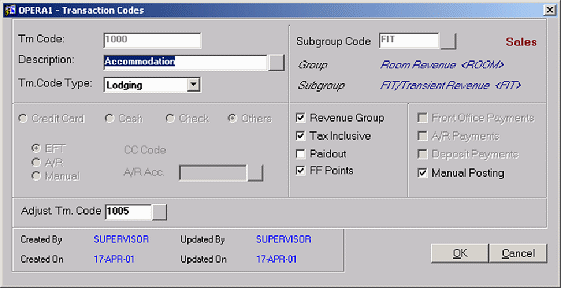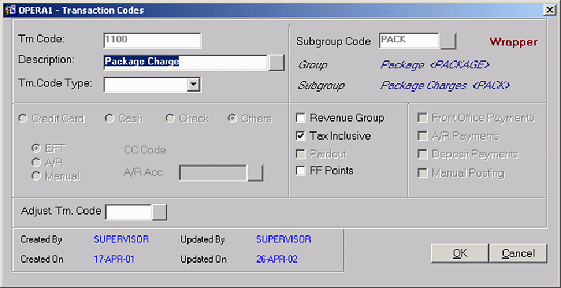
Package Troubleshooting
This topic provides an analysis of a variety of package configurations and how these different scenarios will affect the data stored in the financial tables. Not all scenarios have been described. Rather an overview of those most commonly package configurations in the Asia Pacific Region. This document is intended for Installers and Support technicians with a good familiarity with the OPERA PMS application.
The following terms are used.
Guest Account Debit (GAD). These are amounts the guest has consumed. For example, Rooms Revenue, F&B, Paid Outs, Taxes etc. GAD transactions appear on the guest folio and from within the billing screen, guest account. Guest Account Debits are Revenue- generating transaction types also known as Consumption or Sale items.
Guest Account Credit (GAC). These are usually payments applied to the guest account, for example, Cash, Mastercard, and Visa. GAC transactions appear on the guest folio and from within the billing screen, guest account. A GAC transaction is also called a Payment type transaction.
Package Debit (PDR). Whenever a guest purchases a package, these are the amounts internally posted to that account that are owed to the guest. For example, a package of 250.00 inclusive of a breakfast would generate an internal charge of $200 for Room and $50.00 for breakfast into PDR. PDR transactions are INTERNAL transactions only and not seen in the application. PDR transactions are also considered Consumption or Sale transactions just like Guest Account Debit.
Package Credit (PCR). Whenever a guest purchases a package, these are the amounts posted by the system whenever a package amount is consumed. If the amounts are not consumed then the system will post a package profit. PCR transactions are INTERNAL transactions only and usually not seen in the application.
Item Price. This is the cost of the package to the hotel. The system will reference this amount when posting allowances for the package.
Allowance (Amount). This is the maximum allowance allowed to the guest for that package. OPERA will refer to both the item price and allowance when posting packages. The system will post a package loss when the consumed amount is larger than the item price but less than the allowance. Once the amount posted is greater than the allowance, then OPERA will charge the extra amount to the guest as an Overage.
Product. This is the code that has been defined for that package. Each package uses a unique code.
Following are print screens of the transactions codes used during this analysis.


The tax inclusive/exclusive checkbox is irrelevant for this wrapper code. There must not be generates on the wrapper code. The purpose of the wrapper is as a system code used to post the package rate amount. It is not revenue and should not be configured as such.